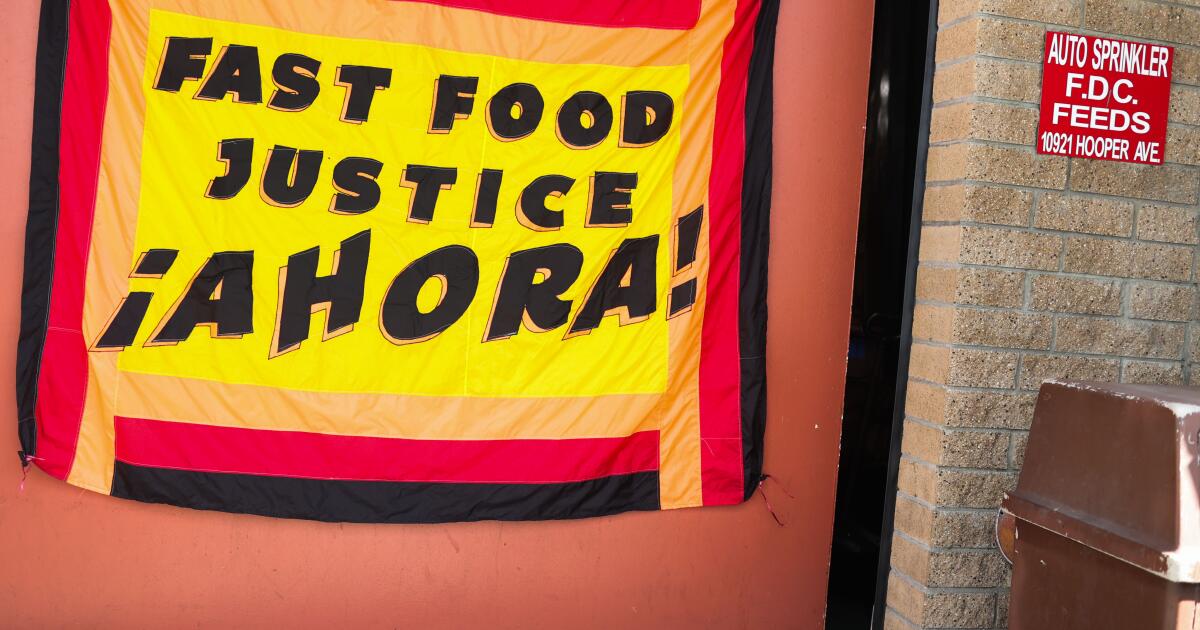Fast-food workers have long complained that their erratic work schedules make it hard to plan for finances, child care, medical appointments and other obligations.
Now, a proposal from Los Angeles City Councilman Hugo Soto Martinez aims to give these workers more stability and consistency in their schedules, as well as paid time off.
The ordinance that Soto-Martinez plans to introduce on Tuesday proposes expanding the city’s Fair Workweek law, which requires employers to inform retail employees of their work schedules in advance, to about 2,500 large fast-food chains that employ roughly 50,000 people.
It also proposes requiring six hours of paid training each year to educate workers on their rights, and requiring fast food workers to accrue one hour of paid vacation for every 30 hours worked, in addition to the paid sick leave to which they are already entitled.
The effort is the latest by state lawmakers to try to improve conditions for low-wage fast-food workers who struggle to make ends meet in expensive cities like Los Angeles. Earlier this year, California set a minimum wage for fast-food workers at $20 an hour.
However, the city’s proposed ordinance is likely to face strong opposition from industry groups.
Some business and industry groups say this type of predictable scheduling policy complicates the staff scheduling process.
The Los Angeles Area Chamber of Commerce said a similar move by Los Angeles County would further hurt businesses already struggling to compete with e-commerce companies, while the California Grocers Association said making last-minute staffing changes would be “extremely difficult.”
Soto Martinez said the idea behind the Los Angeles bill was to give fast-food workers the right to attend weddings, quinceañeras, doctor’s appointments or children’s graduations — rights that are held by many white-collar workers.
“Fast food workers and their needs and wants are often ignored. We as a city need to do our part,” he said.
The proposal is backed by a union of California fast-food workers that formed earlier this year with the backing of the Service Employees International Union, the California Fast Food Workers Union is the culmination of years of strikes by employees over issues such as the handling of sexual harassment claims, wage theft, safety and wages, and the “Fight for $15” movement organized by SEIU in 2012 to raise the minimum wage.
“The 50,000 of us who will gain important protections in the workplace through this ordinance are not just fast food workers, but parents, grandparents, students and caregivers,” Aneesha Williams said in a union statement.
Williams, who works at a Jack in the Box in Los Angeles, is a member of the state’s newly formed Fast Food Council.
Julieta Garcia, 36, who has worked at Pizza Hut in Historic Filipinotown for a year and a half, said her hours are very irregular, averaging about 20 hours a week.
“Mentally, the stress of figuring out how to pay all the bills took its toll on me,” she said.
Garcia said it’s also become harder to see her family. Paid leave would allow her to attend her son’s school play and visit terminally ill family members, she said.
Los Angeles is one of several cities across the country that have implemented scheduling laws, including Seattle, New York and Chicago.
The Los Angeles Fair Work Week Act, approved by the Los Angeles City Council for 2022, already requires major retailers and grocery chains like Target, Ralphs and Home Depot to inform employees of their work schedules at least two weeks in advance. It also requires companies to give employees at least 10 hours of break between shifts or pay them extra for working that time.
Researchers from the Shift Project, a Harvard University and University of California, San Francisco initiative that focuses on service-sector workers, found that unpredictable work schedules lead to income uncertainty, poor sleep, and mental stress.

